译林版必修5 Unit3 Science versus nature Project 课件(25张PPT)
文档属性
| 名称 | 译林版必修5 Unit3 Science versus nature Project 课件(25张PPT) |
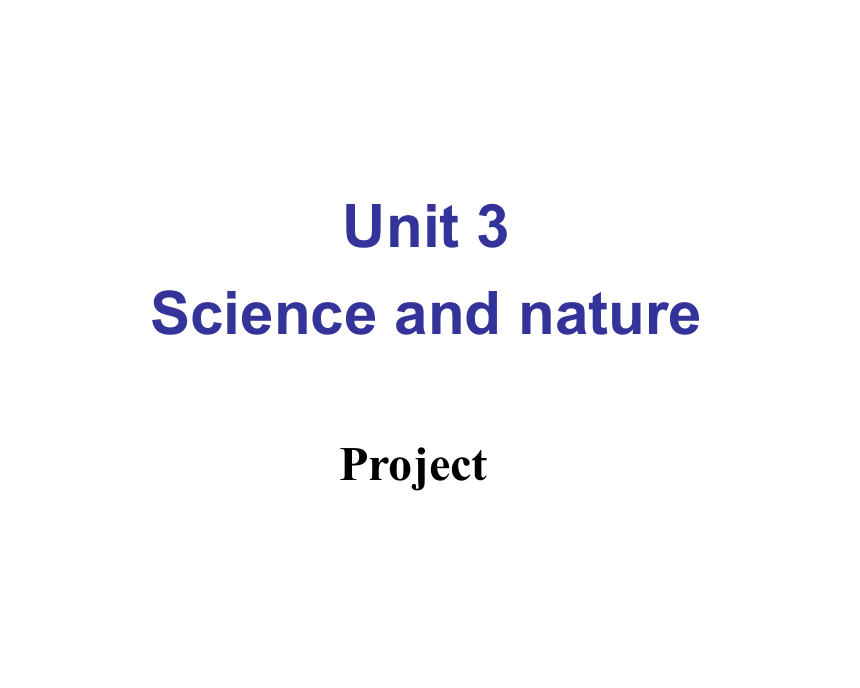
|
|
| 格式 | zip | ||
| 文件大小 | 959.5KB | ||
| 资源类型 | 教案 | ||
| 版本资源 | 牛津译林版 | ||
| 科目 | 英语 | ||
| 更新时间 | 2020-08-21 19:05:45 | ||
图片预览

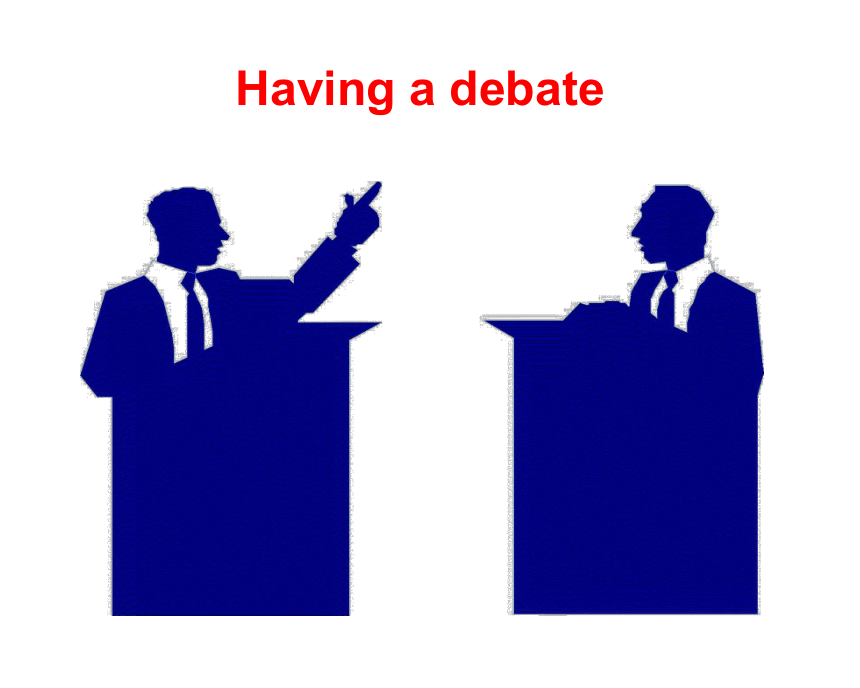
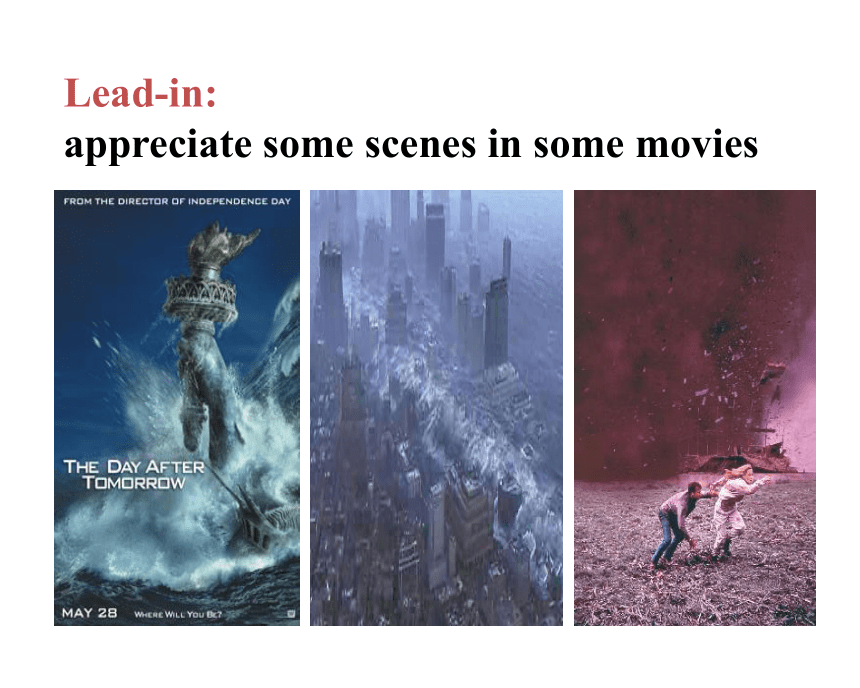

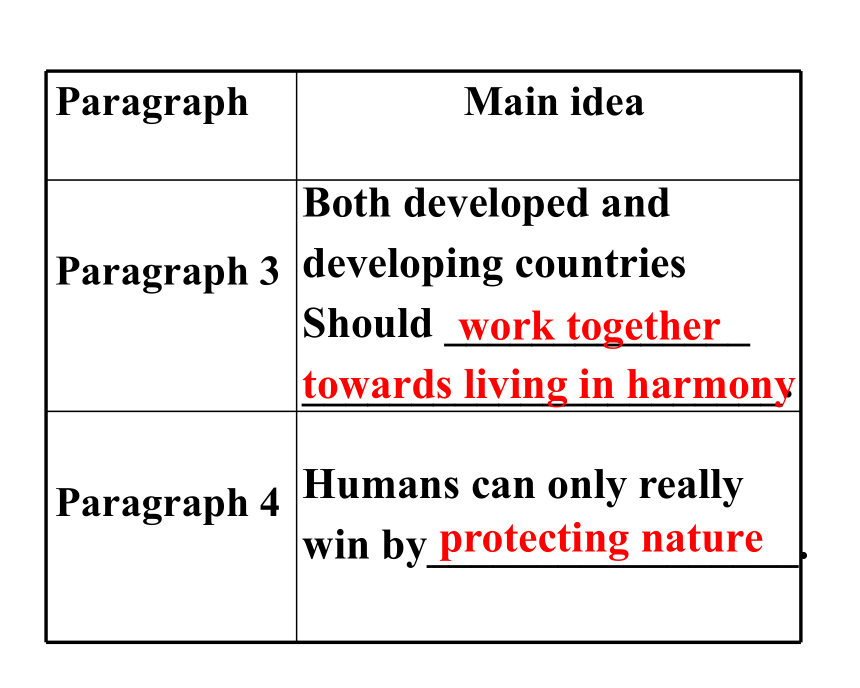

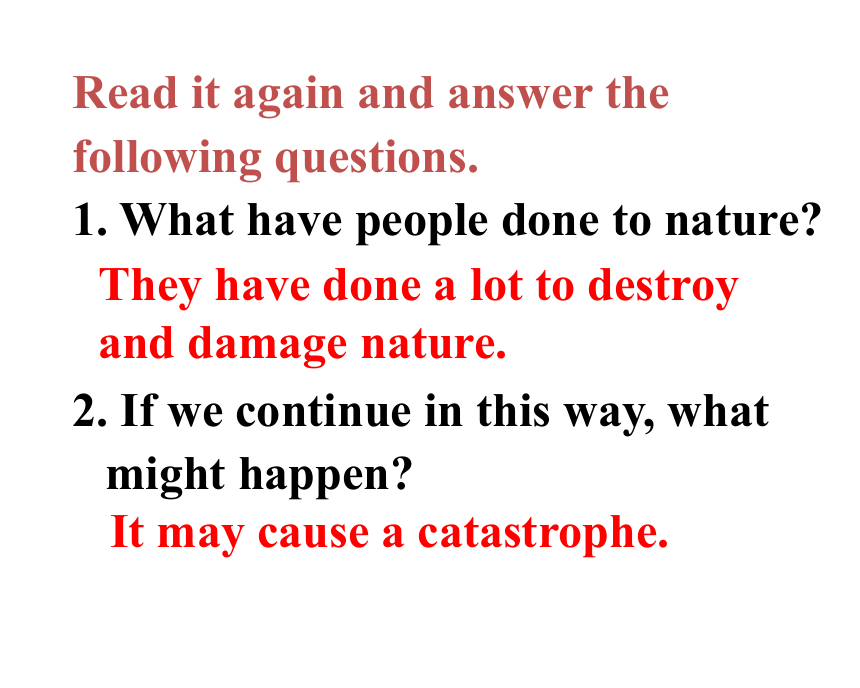
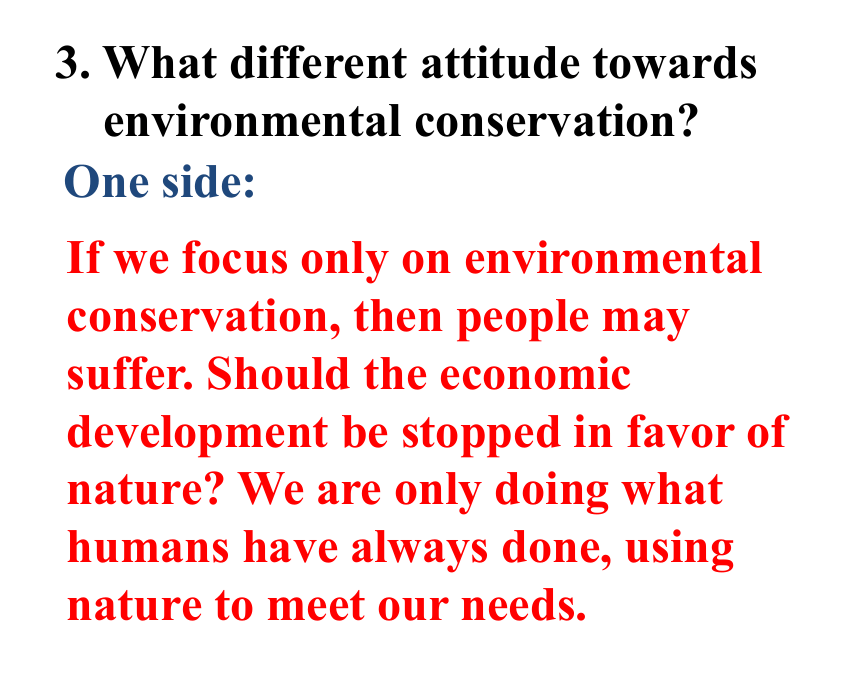
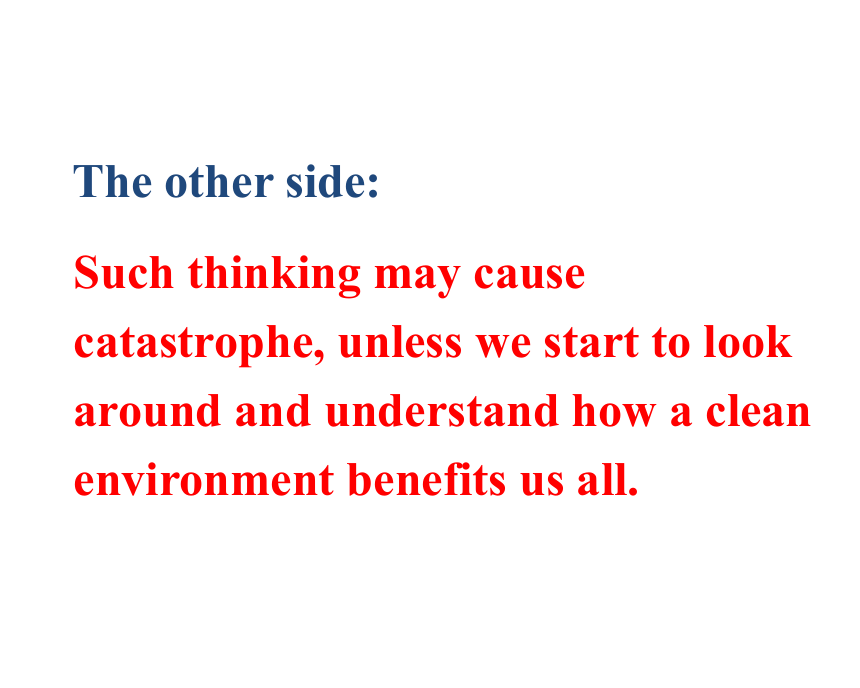
文档简介
(共25张PPT)
Project
Unit
3
Science
and
nature
Having
a
debate
Lead-in:
appreciate
some
scenes
in
some
movies
Read
the
article
and
give
the
main
idea
for
each
paragraph.
Paragraph
Main
idea
Paragraph
1
Paragraph
2
Humans
_____________
_______
the
environment
__________________
towards
the
problem.
Different
attitudes
have
carelessly
damaged
Paragraph
Main
idea
Paragraph
3
Paragraph
4
Both
developed
and
developing
countries
Should
______________
______________________.
Humans
can
only
really
win
by_________________.
towards
living
in
harmony
protecting
nature
work
together
What
is
the
attitude
of
poorer
nations
towards
the
problem?
What
about
the
attitude
of
developed
nations?
Poorer
nations
pay
more
attention
to
economic
development
but
less
to
the
environment
while
developed
nations
do
things
in
a
different
way.
Read
it
again
and
answer
the
following
questions.
1.
What
have
people
done
to
nature?
2.
If
we
continue
in
this
way,
what
might
happen?
They
have
done
a
lot
to
destroy
and
damage
nature.
It
may
cause
a
catastrophe.
If
we
focus
only
on
environmental
conservation,
then
people
may
suffer.
Should
the
economic
development
be
stopped
in
favor
of
nature?
We
are
only
doing
what
humans
have
always
done,
using
nature
to
meet
our
needs.
One
side:
3.
What
different
attitude
towards
environmental
conservation?
The
other
side:
Such
thinking
may
cause
catastrophe,
unless
we
start
to
look
around
and
understand
how
a
clean
environment
benefits
us
all.
Discuss:
1.
Which
is
more
important,
economic
development
or
protecting
nature?
2.
Do
you
think
it
contrary
(矛盾的)
to
develop
economy
while
not
damaging
the
environment?
注意:“地球”只有一个,一旦删除,无法挽回,确定要删除“地球”吗?!
Having
a
debate
Planning
1.
Form
your
groups
2.
Decide
which
topic
your
group
would
like
to
choose
3.Split
group
members
into
For
and
Against.
4.
Give
each
member
of
the
group
a
different
role:
speaker,
researcher,
timekeeper
etc.
5.
Search
for
the
information
about
your
topic.
Internet
magazine
libraries
books
debate
on
TV
debates
on
the
radio
any
other
resources
you
can
use
Preparing:
1.
Sort
the
information
2.
Discuss
and
decide
what
information
to
start
the
debate
with
3.
Keep
a
good
point
for
the
ending
4.
Make
a
list
of
the
points
you
think
your
opposite
members
will
think
of.
5.
Decide
how
to
argue
against
those
points.
Producing:
1.
Practise
the
debate
in
each
group
and
practise
for
many
times.
2.
Decide
how
one
is
going
to
time
each
section
of
your
debate.
Presenting:
1.
Come
together
to
debate
the
topic
in
front
of
the
class.
2.
Display
the
research
on
the
walls.
3.
Decide
the
team
which
change
the
minds
lose
in
the
debate.
Language
points
1.
argue:
v.
[I]
to
speak
angrily
to
sb.,
telling
them
that
you
disagree
with
them:
v.[I
or
T]
to
give
the
reasons
for
your
opinion,
idea,
belief,
etc:
[+
that]
The
children
are
always
arguing.
Kids,
will
you
stop
arguing
with
each
other?
They
were
arguing
over/about
which
film
to
go
and
see.
孩子们一直在争辩。
孩子们,你们能不能彼此停止争论?
他们对于去看哪一部影片在争论.
部长争论以赞成/反对削减军队开支。
The
minister
argued
for/in
favour
of/against
making
cuts
in
military
spending.
两种方式你随便用哪一种为这个案子辩护。
You
can
argue
the
case
either
way.
argument:
n.
[C
or
U]
a
disagreement,
or
the
process
of
disagreeing:
孩子们对于玩什么游戏进行了争论。
The
children
had
an
argument
about/over
what
game
to
play.
在激烈的辩论后最终做出了一个决定。
A
decision
was
finally
made
after
some
heated
argument.
2.
turn
out
:
(1)
to
happen
in
a
particular
way
or
to
have
a
particular
result,
especially
an
unexpected
one:
As
events
turned
out,
we
were
right
to
have
decided
to
leave
early.
(2)
to
be
known
or
discovered
finally
and
surprisingly:
The
truth
turned
out
to
be
stranger
than
we
had
expected.
[+
to
infinitive]
事情真相结果要比我们预料的奇怪。
正如事情结果所证明的,我们决定早点出发是对的。
[+
that]
It
turns
out
that
she
had
known
him
when
they
were
children.
结果是在他们还是孩子的时候她就认识他了。
We
wanted
to
get
home
before
dark,
but
it
didn’t
quite
___
as
planned.
make
out
B.
turn
out
C.
go
on
D.
come
up
高考链接
B
Homework
Display
your
research
on
the
walls
of
your
classroom
after
class.
Project
Unit
3
Science
and
nature
Having
a
debate
Lead-in:
appreciate
some
scenes
in
some
movies
Read
the
article
and
give
the
main
idea
for
each
paragraph.
Paragraph
Main
idea
Paragraph
1
Paragraph
2
Humans
_____________
_______
the
environment
__________________
towards
the
problem.
Different
attitudes
have
carelessly
damaged
Paragraph
Main
idea
Paragraph
3
Paragraph
4
Both
developed
and
developing
countries
Should
______________
______________________.
Humans
can
only
really
win
by_________________.
towards
living
in
harmony
protecting
nature
work
together
What
is
the
attitude
of
poorer
nations
towards
the
problem?
What
about
the
attitude
of
developed
nations?
Poorer
nations
pay
more
attention
to
economic
development
but
less
to
the
environment
while
developed
nations
do
things
in
a
different
way.
Read
it
again
and
answer
the
following
questions.
1.
What
have
people
done
to
nature?
2.
If
we
continue
in
this
way,
what
might
happen?
They
have
done
a
lot
to
destroy
and
damage
nature.
It
may
cause
a
catastrophe.
If
we
focus
only
on
environmental
conservation,
then
people
may
suffer.
Should
the
economic
development
be
stopped
in
favor
of
nature?
We
are
only
doing
what
humans
have
always
done,
using
nature
to
meet
our
needs.
One
side:
3.
What
different
attitude
towards
environmental
conservation?
The
other
side:
Such
thinking
may
cause
catastrophe,
unless
we
start
to
look
around
and
understand
how
a
clean
environment
benefits
us
all.
Discuss:
1.
Which
is
more
important,
economic
development
or
protecting
nature?
2.
Do
you
think
it
contrary
(矛盾的)
to
develop
economy
while
not
damaging
the
environment?
注意:“地球”只有一个,一旦删除,无法挽回,确定要删除“地球”吗?!
Having
a
debate
Planning
1.
Form
your
groups
2.
Decide
which
topic
your
group
would
like
to
choose
3.Split
group
members
into
For
and
Against.
4.
Give
each
member
of
the
group
a
different
role:
speaker,
researcher,
timekeeper
etc.
5.
Search
for
the
information
about
your
topic.
Internet
magazine
libraries
books
debate
on
TV
debates
on
the
radio
any
other
resources
you
can
use
Preparing:
1.
Sort
the
information
2.
Discuss
and
decide
what
information
to
start
the
debate
with
3.
Keep
a
good
point
for
the
ending
4.
Make
a
list
of
the
points
you
think
your
opposite
members
will
think
of.
5.
Decide
how
to
argue
against
those
points.
Producing:
1.
Practise
the
debate
in
each
group
and
practise
for
many
times.
2.
Decide
how
one
is
going
to
time
each
section
of
your
debate.
Presenting:
1.
Come
together
to
debate
the
topic
in
front
of
the
class.
2.
Display
the
research
on
the
walls.
3.
Decide
the
team
which
change
the
minds
lose
in
the
debate.
Language
points
1.
argue:
v.
[I]
to
speak
angrily
to
sb.,
telling
them
that
you
disagree
with
them:
v.[I
or
T]
to
give
the
reasons
for
your
opinion,
idea,
belief,
etc:
[+
that]
The
children
are
always
arguing.
Kids,
will
you
stop
arguing
with
each
other?
They
were
arguing
over/about
which
film
to
go
and
see.
孩子们一直在争辩。
孩子们,你们能不能彼此停止争论?
他们对于去看哪一部影片在争论.
部长争论以赞成/反对削减军队开支。
The
minister
argued
for/in
favour
of/against
making
cuts
in
military
spending.
两种方式你随便用哪一种为这个案子辩护。
You
can
argue
the
case
either
way.
argument:
n.
[C
or
U]
a
disagreement,
or
the
process
of
disagreeing:
孩子们对于玩什么游戏进行了争论。
The
children
had
an
argument
about/over
what
game
to
play.
在激烈的辩论后最终做出了一个决定。
A
decision
was
finally
made
after
some
heated
argument.
2.
turn
out
:
(1)
to
happen
in
a
particular
way
or
to
have
a
particular
result,
especially
an
unexpected
one:
As
events
turned
out,
we
were
right
to
have
decided
to
leave
early.
(2)
to
be
known
or
discovered
finally
and
surprisingly:
The
truth
turned
out
to
be
stranger
than
we
had
expected.
[+
to
infinitive]
事情真相结果要比我们预料的奇怪。
正如事情结果所证明的,我们决定早点出发是对的。
[+
that]
It
turns
out
that
she
had
known
him
when
they
were
children.
结果是在他们还是孩子的时候她就认识他了。
We
wanted
to
get
home
before
dark,
but
it
didn’t
quite
___
as
planned.
make
out
B.
turn
out
C.
go
on
D.
come
up
高考链接
B
Homework
Display
your
research
on
the
walls
of
your
classroom
after
class.
